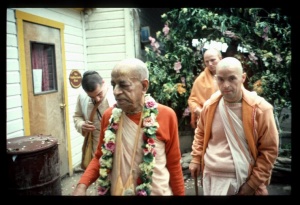SB 4.25.7: Difference between revisions
m (1 revision(s)) |
No edit summary |
||
| Line 1: | Line 1: | ||
{{info | {{info | ||
|speaker= | |speaker=Nārada Muni | ||
|listener=King | |listener=King Prācīnabarhiṣat | ||
}} | }} | ||
[[Category:Srimad-Bhagavatam - Canto 04 Chapter 25|s07 ]] | |||
[[Category:Bhagavatam Verses Spoken by Narada Muni - Vanisource|042507]] | |||
<div style="float:left">'''[[Srimad-Bhagavatam]] - [[SB 4|Fourth Canto]] - [[SB 4.25: The Descriptions of the Characteristics of King Puranjana|Chapter 25: The Descriptions of the Characteristics of King Purañjana]]'''</div> | |||
<div style="float:right">[[File:Go-previous.png|link=SB 4.25.6]] '''[[SB 4.25.6]] - [[SB 4.25.8]]''' [[File:Go-next.png|link=SB 4.25.8]]</div> | |||
{{RandomImage}} | |||
==== TEXT 7 ==== | ==== TEXT 7 ==== | ||
<div | <div class="verse"> | ||
nārada uvāca | :nārada uvāca | ||
bho bhoḥ prajāpate rājan | :bho bhoḥ prajāpate rājan | ||
paśūn paśya tvayādhvare | :paśūn paśya tvayādhvare | ||
saṁjñāpitāñ jīva-saṅghān | :saṁjñāpitāñ jīva-saṅghān | ||
nirghṛṇena sahasraśaḥ | :nirghṛṇena sahasraśaḥ | ||
</div> | </div> | ||
| Line 17: | Line 23: | ||
==== SYNONYMS ==== | ==== SYNONYMS ==== | ||
<div | <div class="synonyms"> | ||
nāradaḥ | ''nāradaḥ uvāca''—the great sage Nārada replied; ''bhoḥ bhoḥ''—hello; ''prajā-pate''—O ruler of the citizens; ''rājan''—O King; ''paśūn''—animals; ''paśya''—please see; ''tvayā''—by you; ''adhvare''—in the sacrifice; ''saṁjñāpitān''—killed; ''jīva-saṅghān''—groups of animals; ''nirghṛṇena''—without pity; ''sahasraśaḥ''—in thousands. | ||
</div> | </div> | ||
| Line 24: | Line 30: | ||
==== TRANSLATION ==== | ==== TRANSLATION ==== | ||
<div | <div class="translation"> | ||
The great saint Nārada said: O ruler of the citizens, my dear King, please see in the sky those animals which you have sacrificed without compassion and without mercy in the sacrificial arena. | The great saint Nārada said: O ruler of the citizens, my dear King, please see in the sky those animals which you have sacrificed without compassion and without mercy in the sacrificial arena. | ||
</div> | </div> | ||
| Line 31: | Line 37: | ||
==== PURPORT ==== | ==== PURPORT ==== | ||
<div | <div class="purport"> | ||
Because animal sacrifice is recommended in the Vedas, there are animal sacrifices in almost all religious rituals. However, one should not be satisfied simply by killing animals according to the directions of the scriptures. One should transcend the ritualistic ceremonies and try to understand the actual truth, the purpose of life. Nārada Muni wanted to instruct the King about the real purpose of life and invoke a spirit of renunciation in his heart. Knowledge and the spirit of renunciation (jñāna-vairāgya) are the ultimate goal of life. Without knowledge, one cannot become detached from material enjoyment, and without being detached from material enjoyment, one cannot make spiritual advancement. Karmīs are generally engaged in sense gratification, and for this end they are prepared to commit so many sinful activities. Animal sacrifice is but one such sinful activity. Consequently, by his mystic power Nārada Muni showed King Prācīnabarhiṣat the dead animals which he had sacrificed. | Because animal sacrifice is recommended in the ''Vedas'', there are animal sacrifices in almost all religious rituals. However, one should not be satisfied simply by killing animals according to the directions of the scriptures. One should transcend the ritualistic ceremonies and try to understand the actual truth, the purpose of life. Nārada Muni wanted to instruct the King about the real purpose of life and invoke a spirit of renunciation in his heart. Knowledge and the spirit of renunciation (''jñāna-vairāgya'') are the ultimate goal of life. Without knowledge, one cannot become detached from material enjoyment, and without being detached from material enjoyment, one cannot make spiritual advancement. ''Karmīs'' are generally engaged in sense gratification, and for this end they are prepared to commit so many sinful activities. Animal sacrifice is but one such sinful activity. Consequently, by his mystic power Nārada Muni showed King Prācīnabarhiṣat the dead animals which he had sacrificed. | ||
</div> | </div> | ||
__NOTOC__ | |||
<div style="float:right; clear:both;">[[File:Go-previous.png|link=SB 4.25.6]] '''[[SB 4.25.6]] - [[SB 4.25.8]]''' [[File:Go-next.png|link=SB 4.25.8]]</div> | |||
__NOTOC__ | |||
__NOEDITSECTION__ | |||
Revision as of 11:11, 28 May 2021

A.C. Bhaktivedanta Swami Prabhupada
TEXT 7
- nārada uvāca
- bho bhoḥ prajāpate rājan
- paśūn paśya tvayādhvare
- saṁjñāpitāñ jīva-saṅghān
- nirghṛṇena sahasraśaḥ
SYNONYMS
nāradaḥ uvāca—the great sage Nārada replied; bhoḥ bhoḥ—hello; prajā-pate—O ruler of the citizens; rājan—O King; paśūn—animals; paśya—please see; tvayā—by you; adhvare—in the sacrifice; saṁjñāpitān—killed; jīva-saṅghān—groups of animals; nirghṛṇena—without pity; sahasraśaḥ—in thousands.
TRANSLATION
The great saint Nārada said: O ruler of the citizens, my dear King, please see in the sky those animals which you have sacrificed without compassion and without mercy in the sacrificial arena.
PURPORT
Because animal sacrifice is recommended in the Vedas, there are animal sacrifices in almost all religious rituals. However, one should not be satisfied simply by killing animals according to the directions of the scriptures. One should transcend the ritualistic ceremonies and try to understand the actual truth, the purpose of life. Nārada Muni wanted to instruct the King about the real purpose of life and invoke a spirit of renunciation in his heart. Knowledge and the spirit of renunciation (jñāna-vairāgya) are the ultimate goal of life. Without knowledge, one cannot become detached from material enjoyment, and without being detached from material enjoyment, one cannot make spiritual advancement. Karmīs are generally engaged in sense gratification, and for this end they are prepared to commit so many sinful activities. Animal sacrifice is but one such sinful activity. Consequently, by his mystic power Nārada Muni showed King Prācīnabarhiṣat the dead animals which he had sacrificed.